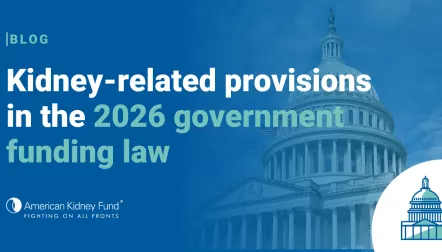
Blog post
AKF's first Rare Kidney Disease Advocacy Day on Capitol Hill

On Sept. 21, AKF hosted its first Rare Kidney Disease Advocacy Day on Capitol Hill, connecting patient advocates from the IgAN Foundation, health care professionals and members of AKF's Unknown Causes of Kidney Disease (UCKD) Coalition with lawmakers on Capitol Hill.
Representing seven states, nine advocates, all of whom have a rare kidney disease, had 23 meetings with their senators' and representatives' offices, including two meetings with members of Congress in attendance.

Participants urged Congressional offices to co-sponsor the Living Donor Protection Act of 2023 (H.R. 2923/S. 1384), and asked Representatives to support the New Era for Preventing End-Stage Kidney Disease Act, which is expected to be introduced in the House of Representatives in the next few weeks. Participants also asked Senate staff if their Senator would consider sponsoring the bill.
In addition, AKF staff and members of the UCKD Public Policy working group met with 11 key House and Senate offices and asked them to support the Access to Genetic Counselor Services Act of 2023 (H.R. 3876/S. 2323).

The Living Donor Protection Act of 2023 (H.R. 2923/S. 1384)
The Living Donor Protection Act of 2023 is bipartisan, bicameral (meaning it has been introduced in both the Senate and House of Representatives) federal legislation that provides critical protections to living organ donors. This bill would codify into law a 2018 U.S. Department of Labor opinion that living donors have Family Medical Leave Act (FMLA) protections to take time off from work to donate an organ and recover from surgery, without risking the loss of their job. This bill would also prohibit life, disability and long-term care insurers from discriminating against living organ donors by denying or limiting their coverage or charging them higher premiums solely due to their status as an organ donor.
Living donor protections currently vary from state to state, so this federal legislation would create a baseline of protections across the country. If enacted, it would result in all 50 states having a grade of a C or better on AKF's State of the States: Living Donor Protection Report Card.

New Era for Preventing End-Stage Kidney Disease Act of 2023
Soon to be introduced by Reps. Gus Bilirakis and Terri Sewell, this legislation aims to improve the understanding and timely and accurate diagnosis of rare kidney diseases. There are about 150 rare kidney diseases and no FDA-approved treatments for most of them, with many patients struggling to receive an accurate diagnosis and expert treatment.
These treatment and diagnostic barriers, coupled with a lack of awareness and education around rare kidney diseases, often cause a delay in diagnosis. This delay can result in a rapid decline in kidney function and ultimately kidney failure, where the only options are dialysis or a transplant.
The New Era for Preventing End-Stage Kidney Disease Act of 2023 would create Centers of Excellence at NIDDK (National Institute of Diabetes, Digestive and Kidney Diseases) to study the causes, diagnosis, progression and treatment of rare kidney diseases and increase public awareness of rare kidney diseases, particularly in rural and underserved communities. The Centers would develop resources for clinical research, training, diagnosis, prevention and treatment of rare kidney diseases.
The bill would also require the Health and Human Services (HHS) Secretary to submit a study to Congress focused on understanding and slowing the progression of rare kidney diseases through early intervention, testing and treatment. The study would examine the quality and reliability of kidney biopsies and the use of genetic tests, including the use of genetic and genomic tests in detecting the APOL1 gene.
In addition, the bill would fund health professional schools to expand primary care training so that it includes rare kidney diseases. It would increase the number of nephrology fellowships aimed at expanding knowledge about rare kidney disease prevention, diagnosis and treatment for populations disproportionately impacted by these diseases, including the prevalence of the APOL1 gene.
The Access to Genetic Counselor Services Act of 2023 (H.R. 3876/S. 2323)
This legislation would change Medicare law so the program would recognize genetic counselors as health care providers, enabling them to be reimbursed directly by Medicare and giving Medicare beneficiaries greater access to genetic counselors' services.
There are several kidney diseases that have a genetic component, including autosomal dominant polycystic kidney disease (ADPKD), Alport syndrome and APOL1 mediated kidney disease. Patients with conditions such as these may benefit from genetic counseling and testing, which could allow for the development of preventive screening and treatment based on their genetic results. This may shorten the length of time to get an accurate diagnosis and reduce the use of ineffective treatments based on inaccurate diagnosis.
In addition, in the United States, an estimated 13% of Black Americans have two of the APOL1 genetic variations. However, not everyone who has two copies of APOL1 genetic mutations will get kidney disease. If you have mutations in both copies of the APOL1 gene, there is a 1 in 5 chance that you will go on to develop kidney disease. There are currently no treatments available for APOL1-mediated kidney disease; however, there are steps you can take to protect your kidneys and promote general health.
AKF is grateful for the patient advocates, health care professionals and our corporate sponsors for their efforts to help us advocate for policies that will improve the lives of those living with rare kidney diseases.
Interested in helping fight for positive change for the kidney community? Sign-up for the Mobile Advocacy Network here, or by texting "KIDNEY" to 52886.
Click here to contact your elected officials through our website and ask them to cosponsor the Living Donor Protection Act of 2023.





